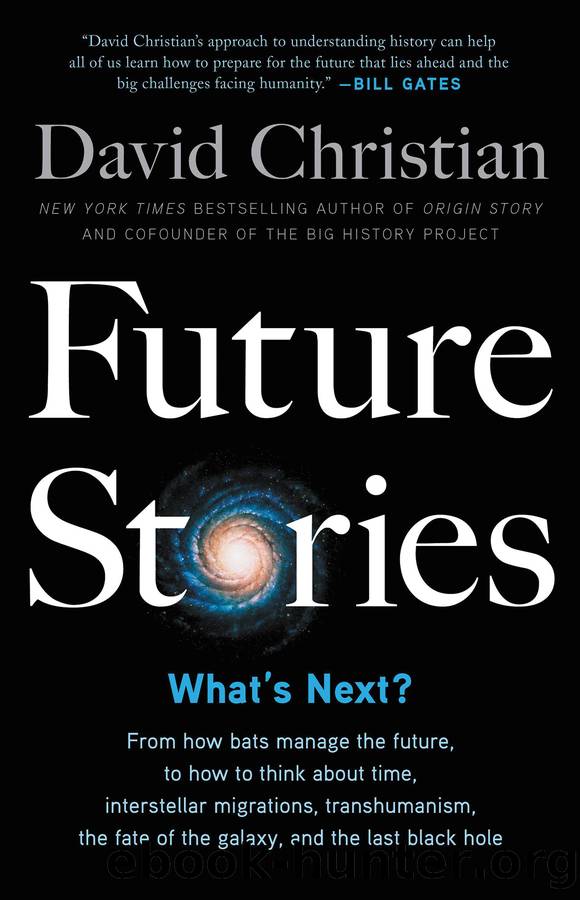Future Stories by David Christian

Author:David Christian [CHRISTIAN, DAVID]
Language: eng
Format: epub
ISBN: 9780316497473
Publisher: Little,Brown
Published: 2022-06-07T00:00:00+00:00
New Technologies, Expanding Networks, and Accelerating Change
Modern technologies have given our species unprecedented power to shape and transform our futures, for better or worse. They allow us to communicate instantaneously over thousands of kilometers, to study objects smaller than a grain of dust or billions of light-years away, and to build machines that can carry us from one side of the world to the other in less than a day. And they have created new dangers. We are now burning fossil fuels on such a scale that we are transforming the atmosphere and oceans, and our weapons of war could ruin the biosphere in a few hours if we were foolish enough to use them. These changes in our ability to manage the future have been described many times in histories of technology.4 So this chapter, like chapters 5 and 6, will focus on changes in thinking about the future.
The extraordinary scale of innovation has generated a new, collective hubris in modern future thinking. The modern idea of âprogressâ tells us we can remake the Earth for our own purposes, and the extraordinary wealth created by modern technologies makes that idea credible, because today, for the first time in human history, a majority of people no longer have to fight tooth and nail to survive. On the other hand, we have also become aware that our new powers have dangerous and unpredictable side effects that could lead to ruin. We have become so powerful that our future thinking is increasingly about how we humans will manage the fate of an entire planet and its many inhabitants.
Globalization and the creation of worldwide networks of exchange have also encouraged future thinking on global scales.5 Before the sixteenth century, the largest human networks were those of Afro-Eurasia. Since then, traders and navigators, using methods both benign and brutal, have woven all human communities into a single planetwide network of almost eight billion people. We know of no other species that has ever been networked globally as humans are today. However, there are striking analogies here to the evolutionary processes that linked individual cells increasingly tightly within the first multicellular âmacrobes.â
Globalization destroyed as it created. From Siberia to Mesoamerica, from the Pacific to Africa, globalization brought European soldiers and Eurasian diseases that destroyed lives, societies, and economies and undermined ancient cultural certainties. In Europe, too, globalization shook up old knowledge, but here elites generally celebrated it because it also brought new forms of wealth, power, and knowledge. For a while, globalization turned what had long been a global backwater into the most dynamic, prosperous, and powerful region on Earth. European governments, traders, and scholars benefited from the creation of the first global networks because, for a few centuries, the region found itself at the center of global flows of power, wealth, and information. That explains why many of the changes we associate with modernity, including new technologies, new forms of economic management, and new forms of future thinking, emerged first in Europe and what
Download
This site does not store any files on its server. We only index and link to content provided by other sites. Please contact the content providers to delete copyright contents if any and email us, we'll remove relevant links or contents immediately.
Kathy Andrews Collection by Kathy Andrews(11831)
The remains of the day by Kazuo Ishiguro(8998)
Spare by Prince Harry The Duke of Sussex(5195)
Paper Towns by Green John(5189)
The Body: A Guide for Occupants by Bill Bryson(5096)
Industrial Automation from Scratch: A hands-on guide to using sensors, actuators, PLCs, HMIs, and SCADA to automate industrial processes by Olushola Akande(5061)
Machine Learning at Scale with H2O by Gregory Keys | David Whiting(4312)
Be in a Treehouse by Pete Nelson(4051)
Never by Ken Follett(3954)
Harry Potter and the Goblet Of Fire by J.K. Rowling(3856)
Goodbye Paradise(3810)
The Remains of the Day by Kazuo Ishiguro(3411)
Into Thin Air by Jon Krakauer(3398)
Fairy Tale by Stephen King(3394)
The Cellar by Natasha Preston(3342)
The Genius of Japanese Carpentry by Azby Brown(3308)
120 Days of Sodom by Marquis de Sade(3273)
Reminders of Him: A Novel by Colleen Hoover(3116)
Drawing Shortcuts: Developing Quick Drawing Skills Using Today's Technology by Leggitt Jim(3080)
